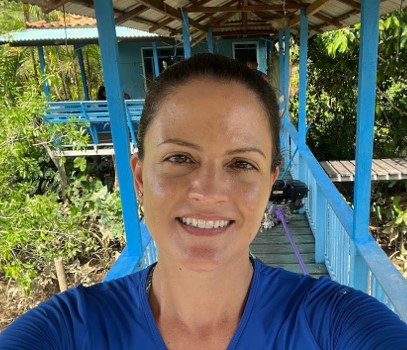Objectives
Click here to download the presentation slides.
Abstract: Climate change and environmental degradation, including rapid deforestation rates, are threatening the Amazon rainforest and the health of traditional peoples who live in the forest. To better understand the health impacts caused by climatic and environmental change and build resilience in low-resource settings, the HARMONIZE project will strategically undertake one-off longitudinal ground truth data collection using drone technology and low-cost weather sensors to improve classification algorithms and downscaling of coarser-resolution environmental datasets (e.g., satellite images, climate reanalysis and forecasts). We will then harmonize this post-processed data with socio-economic and health data in an automated workflow packaged for users in bespoke hotspot-specific toolkits. These solutions are only possible by engaging with stakeholders, users, and local communities to understand their needs and co-design useful toolkits. In November 2022, I travelled to the Brazilian Amazon with the research team to conduct the first round of field campaigns, engagement, and dissemination activities in Pará state in the Brazilian Amazon, one of the key climate change hotspots in HARMONIZE. In this seminar, I will present the findings of community engagement activities and field campaigns and share insights about how it feels to be and to live in the Amazon.
 Short bio: Raquel Martins Lana is a Beatriu de Pinós Postdoctoral Fellow in the Global Health Resilience (GHR) group led by Prof. Rachel Lowe. Raquel's background is in quantitative epidemiology. She investigates the relationship between climate, environment, health, and socio-economic factors in the emergence, transmission and spread of infectious diseases. At the BSC, Raquel works on community engagement to co-design modelling tools for climate-sensitive diseases within the HARMONIZE and Mosqclimate projects. She also collaborates with the Oswaldo Cruz Foundation (Fiocruz) in a data synthesis and nowcasting system for arboviruses (Infodengue) and respiratory diseases (Infogripe). Raquel obtained a PhD in Epidemiology in Public Health at the National School of Public Health in 2017 (ENSP/Fiocruz-RJ, Brazil). Her thesis combined global and local epidemiological studies to understand malaria's geographical retraction and maintenance and the introduction and spread of dengue in the Brazilian Amazon Basin. During her PhD, She won a CNPq scholarship to spend six months at the Liverpool School of Tropical Medicine (UK). Her thesis was awarded the 2017 Oswaldo Cruz Thesis Award. She was a postdoctoral researcher in the Scientific Computing Program (PROCC/Fiocruz-RJ, Brazil) and a visiting researcher at the Center for Integration of Data and Knowledge for Health (CIDACS/Fiocruz-Bahia, Brazil) from September 2018 to February 2022. During this period, Raquel researched malaria transmission heterogeneity throughout Brazil, collaborating on developing a malaria transmission model to measure the impact of tafenoquine implementation in Brazil. She visited the Pasteur Institute (Paris) to develop the transmission model with leading experts in the field. Also, she worked on the Infodengue alert system, improving the dengue epidemiological profile classification and developing weather-driven mathematical models for Aedes aegypti population dynamics and dynamic transmission models for dengue. Raquel served as an adviser to the Brazilian government in responding to the COVID-19 pandemic in Brazil, working in Infogripe. Raquel also worked as a lecturer at the Department of Public Health at the University of Brasília (2018) and in the Post-graduate Epidemiology in Public Health program from the National School of Public Health, Fiocruz (2019-2021). Since 2019, Raquel has co-supervised master and PhD students from Fiocruz and the Federal University of Minas Gerais (UFMG), Brazil.
Short bio: Raquel Martins Lana is a Beatriu de Pinós Postdoctoral Fellow in the Global Health Resilience (GHR) group led by Prof. Rachel Lowe. Raquel's background is in quantitative epidemiology. She investigates the relationship between climate, environment, health, and socio-economic factors in the emergence, transmission and spread of infectious diseases. At the BSC, Raquel works on community engagement to co-design modelling tools for climate-sensitive diseases within the HARMONIZE and Mosqclimate projects. She also collaborates with the Oswaldo Cruz Foundation (Fiocruz) in a data synthesis and nowcasting system for arboviruses (Infodengue) and respiratory diseases (Infogripe). Raquel obtained a PhD in Epidemiology in Public Health at the National School of Public Health in 2017 (ENSP/Fiocruz-RJ, Brazil). Her thesis combined global and local epidemiological studies to understand malaria's geographical retraction and maintenance and the introduction and spread of dengue in the Brazilian Amazon Basin. During her PhD, She won a CNPq scholarship to spend six months at the Liverpool School of Tropical Medicine (UK). Her thesis was awarded the 2017 Oswaldo Cruz Thesis Award. She was a postdoctoral researcher in the Scientific Computing Program (PROCC/Fiocruz-RJ, Brazil) and a visiting researcher at the Center for Integration of Data and Knowledge for Health (CIDACS/Fiocruz-Bahia, Brazil) from September 2018 to February 2022. During this period, Raquel researched malaria transmission heterogeneity throughout Brazil, collaborating on developing a malaria transmission model to measure the impact of tafenoquine implementation in Brazil. She visited the Pasteur Institute (Paris) to develop the transmission model with leading experts in the field. Also, she worked on the Infodengue alert system, improving the dengue epidemiological profile classification and developing weather-driven mathematical models for Aedes aegypti population dynamics and dynamic transmission models for dengue. Raquel served as an adviser to the Brazilian government in responding to the COVID-19 pandemic in Brazil, working in Infogripe. Raquel also worked as a lecturer at the Department of Public Health at the University of Brasília (2018) and in the Post-graduate Epidemiology in Public Health program from the National School of Public Health, Fiocruz (2019-2021). Since 2019, Raquel has co-supervised master and PhD students from Fiocruz and the Federal University of Minas Gerais (UFMG), Brazil.
Speakers
Speaker: Raquel Martins Lana, Global Health Resilience Recognised Researcher, Earth Sciences
Host: Rachel Lowe, Global Health Resilience Leading Researcher, Earth Sciences


